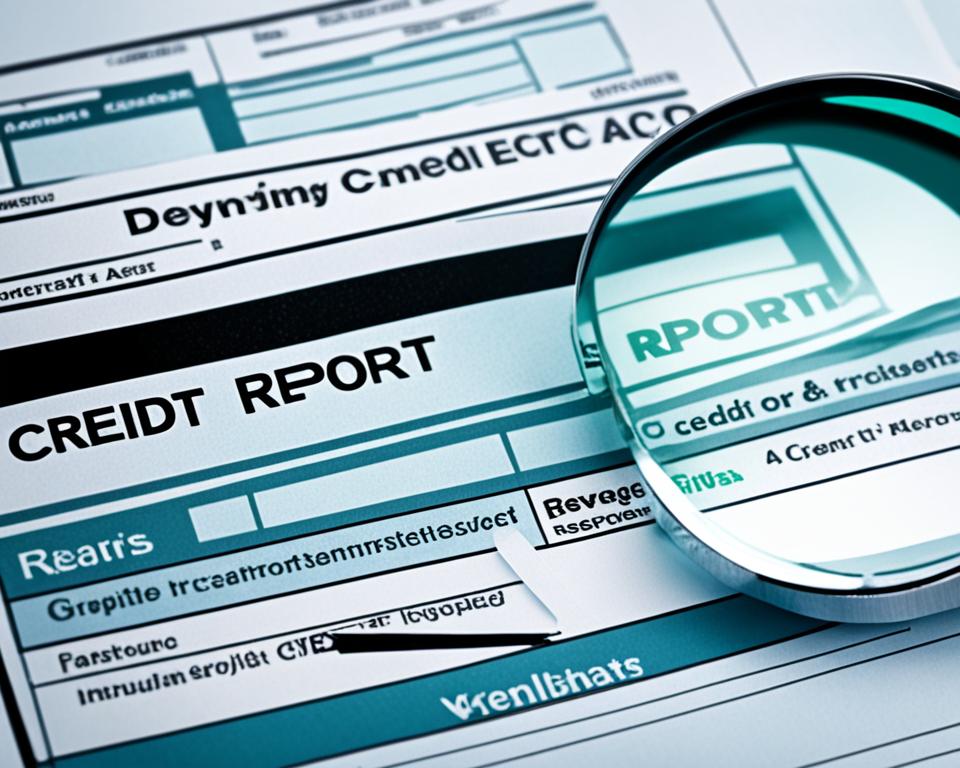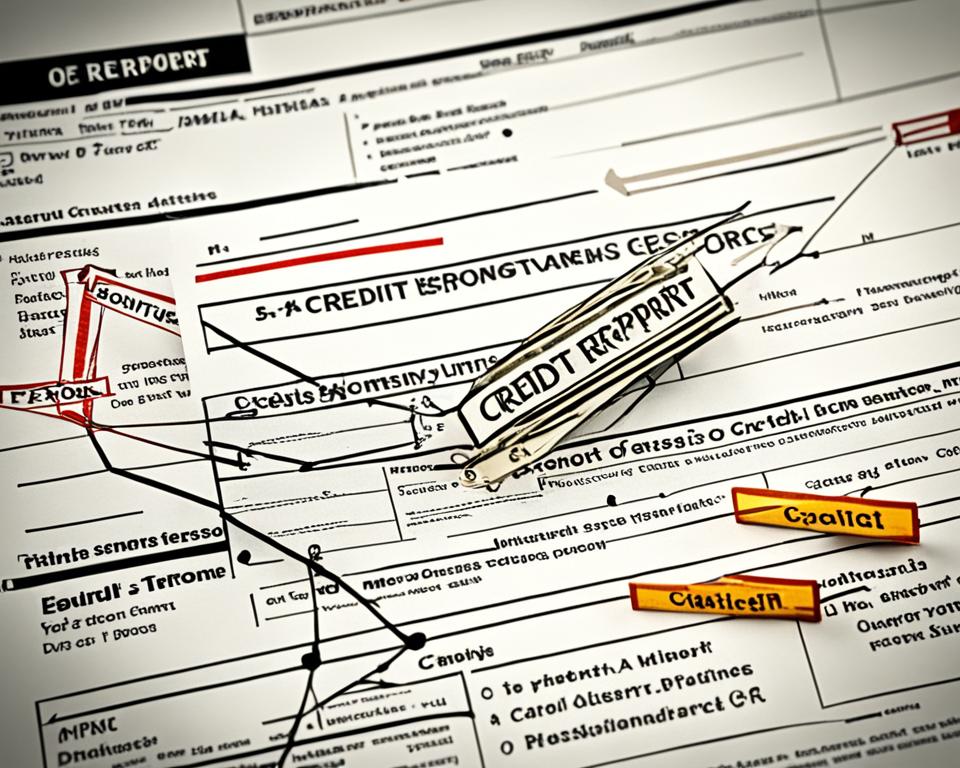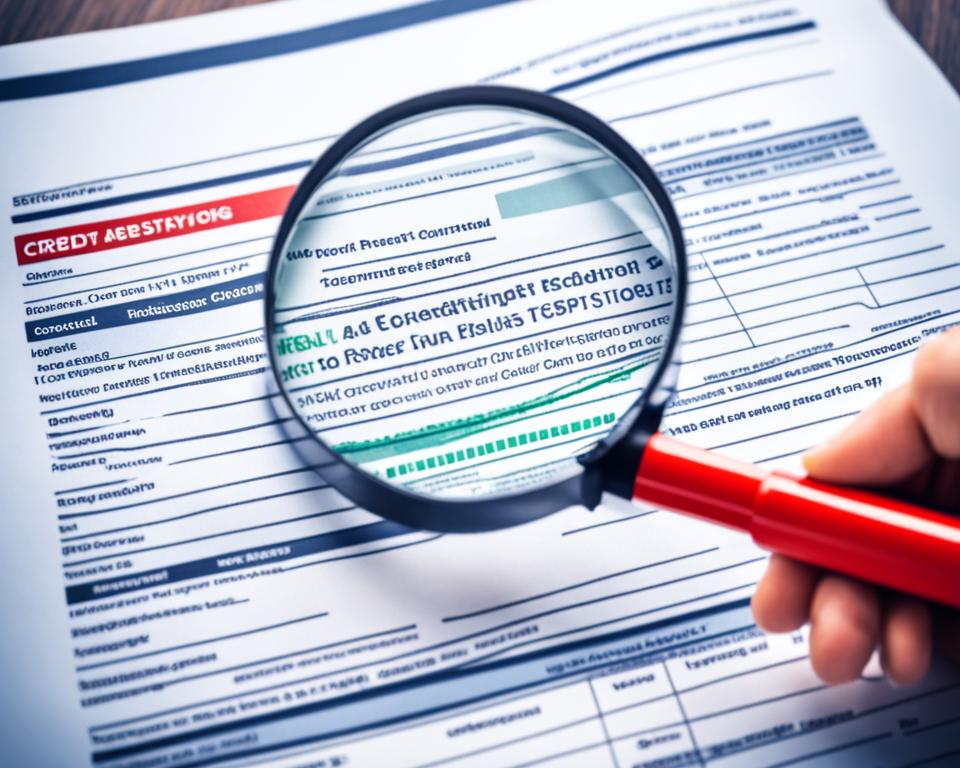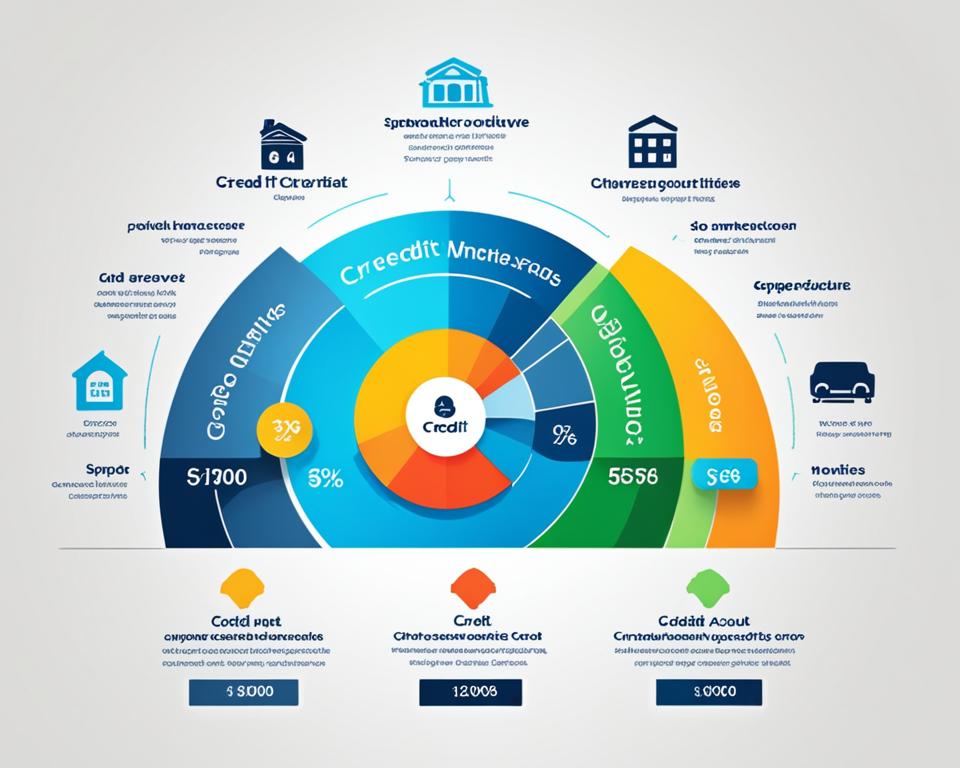Discovering an inaccuracy on a credit report can be unsettling. Fortunately, the process for correcting credit report errors is straightforward, starting with a well-crafted credit report dispute letter. Whether a mistake concerns personal information, account status, or payment history, each of the major credit bureaus—Experian, Equifax, and TransUnion—provides a specific procedure for individuals to contest inaccuracies. Engaging with these bureaus to address and fix credit report errors not only clarifies one’s financial records but can also safeguard creditworthiness.
When individuals take action by disputing errors with the respective bureaus, they initiate a process that may have a positive impact on their credit scores. Communication with bureau representatives, if done correctly, can lead to the removal or correction of erroneous entries. This meticulous approach to maintaining credit report accuracy is an essential step in financial self-advocacy.
Key Takeaways
- Disputing an error on your credit report starts with contacting the relevant credit bureau.
- A detailed dispute letter should include personal information and a comprehensive explanation of the issue.
- Supporting documents are a must to back up any claims made in the dispute.
- Sending disputes via certified mail can provide a record of correspondence.
- Online and phone channels are also available for submitting disputes to credit bureaus.
- Keeping copies of all dispute-related documents is crucial for future reference.
- Correction of errors could potentially improve credit scores and financial standing.
The Importance of Accurate Credit Reports
Ensuring the precision of your credit report is not just about number-crunching or nit-picking data—it’s a crucial element in safeguarding your financial well-being. The integrity of the information contained in your credit report can have extensive repercussions, from your borrowing capabilities to the opportunities and resources you can access. Disputing credit report errors may seem daunting, but it’s a necessary defense against the potential fallout from credit report inaccuracies.
Impact on Borrowing and Interest Rates
An inaccurate credit report can lead to unjustifiably high interest rates, which translates to costlier loans and credit scenarios. The costs over time can accumulate, costing you substantially more than you may realize. When credit report inaccuracies depict you as a higher-risk borrower, lenders are inclined to protect their investment with steeper rates—a stark reminder of why vigilance in managing your credit report is indispensable.
Influence on Job Opportunities and Housing
The narrative your credit report tells can stretch far beyond the confines of financial institutions. Employers often review credit reports to gauge a potential employee’s level of responsibility. Similarly, housing options may narrow if a landlord perceives you as a liability due to faulty credit data. Regular credit monitoring allows you to correct these perceptions and ensure that credit report errors do not diminish your chances of landing your dream job or home.
Insurance Premium Considerations
Insurance companies frequently use the information on your credit report to decide the premiums you’ll pay. A single discrepancy left unchallenged can lead to a significant elevation in your insurance costs. Regular checks and disputing credit report errors can help maintain your premiums at a fair level, clearly illustrating the broad scope of impact that credit report accuracy holds across various facets of personal finance.
Regular assessment of your credit report is the keystone to fending off the adverse effects that errors can have on your life. It is your credit, your money, and ultimately, your future at stake.
Remember, vigilance, along with prompt and informed action, is your best defense against the far-reaching consequences of credit report inaccuracies. It’s not just about a number; it’s about the narrative of your financial identity and the opportunities that should rightly be available to you.
Annual Credit Reports: Your First Line of Defense
Staying informed about the details of your credit report can be the most powerful tool in your financial toolkit. Accessing your annual free credit report is a vital practice for detecting inaccuracies or aberrations that could affect your borrowing power. Proactive steps today can prevent unwelcome surprises tomorrow.
How to Obtain Free Credit Reports
Obtained annually at no charge, credit reports are available from Experian, Equifax, and TransUnion – the three major credit bureaus in the United States. By visiting AnnualCreditReport.com, individuals can request their reports from each bureau once per year without cost. Equifax extends the offer further by providing 6 additional free reports per year through 2026, empowering consumers to closely monitor their financial standing more frequently.
Benefits of Regular Credit Monitoring
Maintaining a regular schedule for checking your credit reports is a cornerstone for sound financial health. It not only confirms accurate reporting but also ensures early detection of potential identity theft—aspects that could lead to unwelcome consequences if left unaddressed. Knowledge is power, and knowing how to dispute credit report mistakes starts with regular reviews of your credit history.
Regular monitoring is akin to a financial safety check, allowing you to promptly contest any errors, thus maintaining the integrity of your credit report. It is a layer of defense that safeguards not only your credit score but also your reputation when applying for loans or credit. Setting an annual reminder to check your credit reports is a simple yet effective habit that can yield long-term benefits.
Through vigilance and the utilization of annual free credit reports, consumers can establish a proactive stance in maintaining their credit well-being.
Identifying Common Credit Report Errors
To maintain a healthy credit score and ensure fair access to credit, it is crucial for individuals to actively engage in the credit bureau dispute process. Doing so begins with the identification of common errors on credit reports. A thorough review of your credit report can uncover inaccuracies that may be impacting your credit score negatively. Understanding and identifying these errors is the first step towards disputing credit report errors and safeguarding your financial reputation.
Mistaken Identity and Merged Accounts
One of the most frequent mistakes on credit reports originates from mistaken identity or merged accounts. This usually occurs when two individuals with similar identifying information, such as a name or Social Security number, are incorrectly assumed to be the same person. As a result, accounts that belong to another individual may appear on your credit report, which can lead to significant mistakes in your credit history. Consistent use of personal information such as full legal name and correct Social Security number can greatly reduce these types of errors.

Incorrectly Reported Payment Histories
Inaccuracies in payment histories are another common area of contention. This could include payments that were made on time but reported as late, incorrect account statuses, or even completely fabricated entries. Carefully examining payment histories and matching them against your own records is essential in catching these discrepancies. If you spot payment history inaccuracies, document them meticulously as part of the dispute process.
Outdated or Wrong Information
Credit reports may also contain outdated information that should no longer be impacting your credit score. For instance, debts that have been successfully settled may still be shown as outstanding, or accounts that have been closed could be listed as open. By law, most negative credit information must be removed from your report after a set period, typically seven years. If your report includes outdated information, it’s important to challenge this with the relevant credit bureau.
Below is a detailed overview of categories where errors can commonly occur:
| Category | Description of Common Errors | Action to Take |
|---|---|---|
| Personal Information | Mistakes in name, SSN, address, or date of birth | Provide correct info and supporting documentation |
| Account Status | Incorrect reporting of account closures or delinquency | Dispute with evidence of account status |
| Payment History | Payments reported as late that were paid on time | Dispute with proof of timely payments |
| Outdated Information | Old debts still listed; negative items past 7 years | Dispute to have outdated info removed |
| Balance Errors | Incorrect account balances or duplicate accounts | Dispute with current statements showing correct balances |
Ensuring the accuracy of each section of your credit report is imperative. When errors are identified, swiftly engage in disputing credit report errors through the appropriate credit bureau’s dispute process. Rectifying these errors not only improves your current financial landscape but prevents future misunderstandings in your credit-related endeavors.
Steps to Correct Credit Report Inaccuracies
When it comes to disputing credit report errors, taking informed and strategic steps can make all the difference. Credit report inaccuracies can hinder financial opportunities, making it essential to address these issues with both credit bureaus and information providers. Here’s a comprehensive guide for consumers looking to navigate the process of disputing inaccuracies, detailing the documentation needed and the methods of submission accepted by the bureaus.
Before initiating the dispute process, it’s crucial for consumers to gather all relevant documentation that supports their claim. This may include proof of payment, legal documents, or account statements that highlight the accuracy of their records versus what is reflected on their credit reports. With adequate preparation, consumers can ensure their disputes are understood and taken seriously by the credit bureaus.
As technology evolves, so do the modes of submitting disputes. Each of the three major credit bureaus now readily accepts disputes online, providing consumers with an accessible and immediate way to commence the correction process.
The key is to clearly identify each item that is inaccurate on the credit report, stating the reason behind the dispute and precisely what change is being requested—be it a correction or a deletion. Using this approach, the path toward rectifying credit report inaccuracies is made clearer for all parties involved.
| Step | Description | Documents Needed | Submission Methods |
|---|---|---|---|
| 1. Identify Inaccuracies | Review your credit report thoroughly to spot any errors. | Credit report with errors highlighted | N/A |
| 2. Collect Documentation | Gather all documents that support your claim of an error. | Proof of payment, legal documents | N/A |
| 3. Draft Dispute | Clearly articulate each error and the desired correction. | Dispute letter or filled dispute form | Online, Mail |
| 4. Submit Dispute | Send your dispute to the credit bureau(s) holding the error. | Completed dispute form, supporting documents | Online, Mail |
| 5. Follow Up | Wait for the resolution and verify that changes are made. | Correspondence from credit bureaus | Online, Phone, Mail |
In sum, taking a proactive role in disputing credit report errors can significantly influence your financial health. Armed with the right documentation and a clear understanding of the dispute submission process, consumers can pursue the correction of inaccuracies with confidence. Maintenance of one’s credit report should be seen as an ongoing priority, with regular reviews and swift actions when discrepancies are found.
Preparing Your Dispute: What You Need
In the path to rectifying errors on your credit report, effective preparation is as crucial as the dispute process itself. Having a clear strategy for gathering evidence and drafting your credit report dispute letter will enhance the credibility of your claim. As you set these pieces in motion, keep in mind the importance of detailing each discrepancy in a manner that compels the credit bureaus to act on your behalf.
Gathering Documentation and Evidence
Before you can submit a dispute, you must collect the relevant evidence. This often includes bank statements, account records, or any correspondence that can establish the grounds of your dispute. It’s imperative to demonstrate the disconnect between what’s reported and the factual reality, ensuring your dispute is not disregarded as baseless. Approach this stage with thoroughness, considering every document that might influence the decision of the credit bureaus.
Drafting an Effective Dispute Letter
Once your documentation is in order, the next step is to draft a comprehensive and effective credit report dispute letter. This letter should not only list each item you are disputing but also elaborate clearly why you believe the item is incorrect and what you would like to be done about it. Strive for clarity and precision, facilitating the review process for the recipients—the credit bureaus.
A template might be beneficial but ensure that your dispute letter is personalized to reflect an accurate account of your individual circumstances. It should be more than a mere expression of dissatisfaction; your letter must be a compelling case for correction, one that leaves no room for ambiguity.
Setting the stage correctly with thorough documentation and a well-constructed dispute letter is a productive beginning to disputing credit report errors. As you step into this process, these initial efforts can make a significant difference in how swiftly and favorably your dispute is resolved. Empower yourself with knowledge and the necessary tools, and take command of your credit standing.
Identifying and Disputing Errors on Your Credit Report
Mistakes on your credit report can have severe implications for your borrowing ability and overall financial health. It is essential that you perform a diligent scrutiny of your credit report and become acquainted with how to dispute credit report mistakes. By correcting inaccuracies, you or a financial advisor not only cleanse your financial profile but potentially enhance your credit score, fostering better loan terms and reduced interest rates.
Disputing credit report errors is not just a right—it’s a significant aspect of financial maintenance. A well-documented dispute can prompt the credit bureaus to investigate and rectify any inaccuracies that may have found their way onto your report. Precise action during this dispute process ensures that any rectifiable errors are addressed in due course.

To begin the dispute process, review your credit report line by line. Highlight or note any discrepancies or anomalies that do not align with your financial records. Each flagged error requires a formal dispute, sent directly to the credit bureau that has reported the mistake. This dispute should be detailed, explaining why the item is incorrect and providing proof to support your claim.
- Gather statements and documentation that prove the errors.
- Draft a dispute letter that details each discrepancy on your credit report.
- Include personal identification and account numbers pertinent to the errors being disputed.
- Suggest appropriate corrections or request the removal of incorrect information.
- Send the dispute via a method that can be tracked, such as certified mail with a return receipt.
- Keep a copy of your dispute letter and any attachments for your records.
Ensuring the data on your credit report represents your true financial history not only allows for fair credit opportunities but also guards against the inadvertent propagation of errors. Act swiftly and meticulously to contest any unwarranted blemishes on your credit record.
Disputes are not just urgent; they are a fundamental advocacy for your financial integrity. As you prepare to alert credit bureaus of inaccuracies, remember the process is a partnership. It necessitates clear, accurate communication from you as a consumer and a committed resolution effort from the reporting agency.
By taking the initiative to dispute credit report errors, you can ensure your financial portrait is painted in the truest light, thereby unlocking doors to appropriate credit and the many benefits that come with financial credibility.
Best Practices for Communicating with Credit Bureaus
Effectively communicating with credit bureaus is a critical step in the credit bureau dispute process. Each of the main bureaus—Equifax, Experian, and TransUnion—has its own guidelines for managing disputes, making it imperative for consumers to follow these procedures carefully to avoid delays or rejections of their dispute claims. Proper documentation, accurate completion of dispute forms, and knowing the available channels, such as online, mail, and phone, are essential in fixing credit report errors.
Equifax Dispute Process
Initiating a dispute with Equifax requires a clear and detailed explanation of each error. The Equifax dispute process allows consumers to submit their disputes through various channels. It’s important to include necessary documentation and to track any correspondence for future reference.
Experian’s Dispute Handling
Experian provides a streamlined online dispute process for consumers. When handling disputes, Experian emphasizes the importance of directly addressing each point of contention. Documents that substantiate the dispute are also crucial when fixing credit report errors with Experian.
TransUnion Dispute Procedures
TransUnion’s dispute procedures suggest beginning the process as soon as an error is identified. Consumers can dispute through multiple formats, and support from TransUnion is typically available to aid in clarifying any necessary steps to ensure the dispute is filed appropriately.
Here is a comparative overview of the contact methods for the three main credit bureaus:
| Credit Bureau | Online | Phone | |
|---|---|---|---|
| Equifax | www.equifax.com/personal/credit-report-services/credit-dispute/ | Equifax Information Services LLC P.O. Box 740241 Atlanta, GA 30374 | (866) 349-5191 |
| Experian | www.experian.com/disputes/main.html | Experian P.O. Box 4500 Allen, TX 75013 | (888) 397-3742 |
| TransUnion | dispute.transunion.com | TransUnion Consumer Solutions P.O. Box 2000 Chester, PA 19016-2000 | (800) 916-8800 |
Engaging effectively with credit bureaus is key to resolving discrepancies and securing a more accurate credit report. Armed with the understanding of the credit bureau dispute process, consumers can assert their rights and promote the accuracy of their financial profiles, ultimately contributing to their financial well-being.
Understanding the Dispute Investigation Process
When you take steps toward disputing credit report errors, it’s helpful to understand what unfolds behind the scenes. Navigating the credit bureau dispute process requires a grasp of the investigation phases and the specific roles you and the credit bureaus play.
What Happens After Filing a Dispute
Upon receiving a dispute, credit bureaus embark on a methodical investigation, typically within a 30-day timeframe. This process involves a meticulous examination of the evidence you’ve submitted to support your claim. The information is not only scrutinized by the bureaus but is also shared with the entity that provided the initial data.
The evidence presented in your dispute is key as it directly impacts the credit bureau’s next move. Should the bureau categorize your dispute as superficial or lacking substance—referred to as ‘frivolous’—you’ll be notified promptly, with reasons explained. However, if the dispute holds merit, the next step for the bureau is to reach out to the original source of the contested data for their review and response.
Timelines and Resolutions
A standard dispute demands a swift and structured response from the credit bureaus. Within the stipulated 30 days, the bureau must complete its investigation and inform you of the outcome. If the conclusion is positive, with the business agreeing to the inaccuracies, swift action is taken across all bureaus to correct your report, potentially reflecting favorably on your credit score.
| Action | Description | Timeframe | Outcome for Consumer |
|---|---|---|---|
| Filing a Dispute | Consumer submits dispute with evidence | Day 1 | Initiation of investigation |
| Bureau Investigation | Credit bureau reviews evidence | 1-30 days | Pending resolution |
| Business Review | Original information provider assesses dispute | Concurrent with bureau investigation | Correction of records if necessary |
| Reporting Correction | Credit bureaus update consumer’s file | After business agrees to inaccuracies | Amended credit report |
| Final Notification | Consumer receives investigation results | By end of 30 days | Summary of alterations to the credit report |
Understanding the intricacies of the investigation process can equip you to take proactive steps in ensuring the accuracy of your credit reports. The collaboration between consumer, credit bureaus, and information providers plays a crucial role in upholding the integrity of credit information, thus safeguarding consumer rights within the credit landscape.
Advanced Tactics: Addressing More Complex Errors
When it comes to disputing credit report errors, certain situations call for more nuanced strategies than a typical dispute. Complex cases, particularly those involving identity theft or similar forms of fraud, may not be rectifiable through the standard process alone. These instances require a steadfast approach, with consumers often finding themselves taking additional steps to ensure the integrity of their credit information.

Amending such credit report inaccuracies often begins with an escalated communication with credit bureaus or, in some circumstances, seeking legal counsel. This heightened level of advocacy is essential for complex errors that resist initial correction attempts and persist over time.
When addressing these stubborn inaccuracies, it is crucial to maintain detailed records of all communications. This document trail not only serves as evidence should the matter require legal resolution but also helps ensure that credit bureaus and information providers are held accountable throughout the correction process. Vigilance and detailed documentation underscore all successful efforts to remedy the most stubborn of credit report errors.
- Gather all available evidence related to the complex error.
- Engage with the credit bureau via suggested dispute channels.
- Consider escalating the dispute if initial attempts don’t resolve the issue.
- Seek legal advice if the error entails legal complexities, such as identity theft.
- Maintain meticulous records of all communications and steps taken.
- Follow up regularly with credit bureaus to track the progress of your dispute.
- Monitor your credit report frequently to ensure the error is corrected.
For those facing the challenge of correcting credit report errors of a more intricate nature, these advanced tactics are not just recommendations but can be the difference between an ongoing issue and a resolved credit history. Ensuring accuracy within a credit report should be seen as an ongoing commitment to one’s financial health and advocacy for one’s own financial rights.
The resolution of complex credit report errors often extends beyond a single dispute. It necessitates a comprehensive understanding of the credit reporting system, tenacity in following up on disputes, and sometimes, professional legal assistance.
The Role of Creditors in the Dispute Process
Understanding the significance of creditors in the credit bureau dispute process is paramount for anyone looking to clean up their credit report from inaccuracies. Not only do credit bureaus rely on information provided by creditors, but these financial institutions also bear the responsibility for correcting any misinformation they report. As such, the proactive engagement of creditors is a cornerstone in correcting credit report errors and ensuring the accuracy of credit reports.
Getting Creditors to Update Information
When information on your credit report does not accurately reflect your credit history due to reporting errors by creditors, it is necessary to take decisive steps to rectify these issues. The dispute initiation often involves sending a comprehensive dispute letter directly to the creditor, detailing out the specific areas of concern and requesting an update or correction. In addition to addressing the issues with the credit bureaus, such direct correspondence ensures that all bases are covered in the quest to amend credit report inaccuracies.
When Creditors Report Incorrect Data
Creditors might inadvertently report incorrect data to credit bureaus, leading to an array of complications for consumers. In instances where creditors continue to report erroneous information, it’s critical for consumers to assert their rights. Not only should these discrepancies be disputed with the credit bureaus themselves, but communication with the creditor must reflect the seriousness of the error. A holistic approach to disputing requires that creditors acknowledge the error by marking the information as disputed when reporting to the credit bureaus—this transparency is key in maintaining a fair credit reporting environment.
Below is a suggested format for corresponding with creditors to facilitate the resolution of disputed items:
| Step | Action | Result |
|---|---|---|
| 1 | Identify inaccurate information | Clear understanding of the error |
| 2 | Document the error and gather supporting evidence | Evidence to back up the claim |
| 3 | Send a dispute letter to the creditor | Creditor is made aware of the dispute |
| 4 | Follow up with both creditor and credit bureaus | Error is tracked until resolved |
In summary, creditors have an essential role in correcting credit report errors, and it is within your rights as a consumer to urge them to uphold their part of the process. After all, ensuring the completeness and accuracy of your credit report is an endeavour that can reap significant benefits for your financial health in the long run.
Legal Rights Under the Fair Credit Reporting Act (FCRA)
The Fair Credit Reporting Act plays a pivotal role in the credit bureau dispute process, ensuring that consumers have the legal right to an accurate credit history. Recognizing these rights can empower individuals to take action when their credit report contains discrepancies. The FCRA mandates that both credit bureaus and information providers promptly investigate and resolve disputes at no charge to consumers, highlighting consumer protection as a federal priority.
Disputes are more than just challenging entries on a report; they are an exercise of consumer rights under the FCRA. Consumers can leverage the following provisions to ensure fair and accurate credit reporting:
- Right to Accuracy: Credit bureaus are required by law to maintain correct and complete information on consumer credit reports.
- Dispute Resolution: When inaccuracies are spotted, consumers can initiate disputes, and bureaus must investigate—typically within 30 days.
- Consumer Notification: Following an investigation, bureaus must inform consumers about the results and any changes made to the report.
- Right to a Statement of Dispute: If the dispute does not resolve in consumer’s favor, they can request to include a statement of dispute in their credit file, although a fee may apply for this service.
It is essential to understand that initiating a dispute does not guarantee a change in the credit report, but it does trigger an obligatory review process. The outcome of this process can potentially yield corrections that align reported information with true credit history.
The Fair Credit Reporting Act lays the foundation for a faithful representation of one’s creditworthiness and provides a structured method for addressing concerns with credit data. By utilizing the protections afforded by the FCRA, consumers can maintain greater control over their financial narratives.
In summary, the FCRA ensures that the credit bureau dispute process is conducted with due diligence, safeguarding the consumer’s interest. Engaging with credit reporting agencies within the framework of these rights is a critical step towards maintaining a sound credit health.
After the Dispute: Next Steps
Once the process of fixing credit report errors reaches its initial resolution, it’s crucial that you take the time to thoroughly review the changes on your updated credit reports. This is your opportunity to confirm that each and every dispute was addressed accurately and reflects the true state of your credit history. Your vigilance and responsiveness are vital in maintaining the integrity of your credit information.
Reviewing Updated Credit Reports
After successfully disputing credit report errors, you should obtain a copy of your updated credit report from each bureau involved in the dispute. It’s essential to examine each report closely to ensure that all inaccuracies have been amended. If you find that corrections have not been made accurately or entirely, additional follow-up with the bureaus may be necessary.
Persistence in Monitoring Future Reports
In the financial world, persistence is key for ensuring ongoing accuracy in your credit reports. Continuous monitoring is crucial; not only does it provide peace of mind, but it also affords the opportunity to catch and quickly address any future credit report inaccuracies. Remember, you’re entitled to a free credit report annually from each major bureau, and in some instances, more frequent access is granted after lodging a dispute. Take advantage of this to maintain a clear and accurate credit profile.
Your proactive efforts don’t just contribute to your personal financial health; they also set a precedent for what consumers should expect in terms of accuracy and transparency from credit bureaus. By confirming corrections and persistently monitoring future credit reports, you are taking essential steps in managing your credit and standing guard against potential errors that could surface down the road.
When Errors Persist: Additional Recourse
Despite determined efforts at disputing credit report errors, there may be occasions where discrepancies persist even after the initial credit bureau investigation. When faced with such circumstances, it is essential for consumers to be aware of the additional steps they can take to advocate for the correctness of their credit reports.
Adding a Statement of Dispute to Your Credit File
In the event that credit report inaccuracies are not resolved to your satisfaction, you have the option to add a statement of dispute to your credit file. This statement becomes a permanent part of your report and can provide context to future readers, potentially influencing their decisions made based on your credit history. It should succinctly describe the nature of the dispute and your standpoint on the matter.
Legal Considerations and Seeking Professional Help
If you have exhausted all avenues in disputing credit report errors and still find inaccuracies that affect your financial standing, pursuing legal assistance may be a viable next step. Attorneys specializing in consumer rights and credit reporting laws can offer guidance on enforcing your rights under the Fair Credit Reporting Act (FCRA). They can assist in navigating more complex dispute processes and, if necessary, represent you in legal proceedings to correct your credit records.
It is crucial to keep comprehensive records and copies of all correspondences throughout the dispute process. Remain persistent and informed about your rights when addressing credit report inaccuracies. A detailed and evidenced-based approach will bolster your position, whether you’re adding a statement of dispute or seeking the assistance of a legal professional.
Credit Repair and Seeking Expert Assistance
Navigating the process of correcting credit report errors can be fraught with complexities and nuanced legalities. It’s not uncommon for consumers to solicit credit repair assistance in order to streamline and simplify this process. Expert assistance can prove invaluable, especially when facing a labyrinth of credit report details that require thorough investigation and understanding.
Professional credit repair services specialize in dissecting credit reports and pinpointing inaccuracies that may be affecting your credit score. These experts employ strategic approaches, honed through years of experience, to efficiently manage and contest these errors. Here’s why seeking expert help might be the right move for those grappling with persistent credit report issues:
- Time-Saving: Credit repair professionals can save consumers an extensive amount of time by handling disputes and negotiations on their behalf.
- Expert Knowledge: With an in-depth understanding of credit laws and dispute practices, experts provide a tactical edge in correcting credit report errors.
- Results-Oriented: Their familiarity with credit bureaus’ processes increases the likelihood of achieving favorable outcomes in disputes.
- Personalized Plans: Credit repair agencies craft personalized strategies tailored to each individual’s unique credit situation.
Yet, it is important for consumers to carefully consider and vet any credit repair company they intend to use. Reputable services should operate transparently and abide by the Credit Repair Organizations Act (CROA), ensuring they engage in lawful and ethical practices.
| Consideration | Why It’s Important | Benefits |
|---|---|---|
| Legitimacy | Ensures company abides by federal consumer protection laws | Peace of mind and protection from scams |
| Services Offered | Defines what assistance you’ll receive | Matches services to your specific credit repair needs |
| Cost | Identifying upfront and ongoing fees | Prevents unexpected expenses |
| Customer Reviews | Provides insight into others’ experiences with the company | Helps gauge the efficacy and trustworthiness of services |
Professional credit repair can be particularly effective for those who feel overwhelmed by the credit bureau dispute process or whose efforts to self-advocate have proven unsuccessful. With their comprehensive understanding and refined negotiation skills, these experts offer a streamline to potentially improved credit scores and financial opportunities.
Engaging expert credit repair assistance can transform the complex task of disputing into a more approachable and manageable endeavor, ensuring that your efforts in correcting credit report errors are both precise and effective.
Ultimately, the decision to hire professional help should be weighed against the severity of credit report issues and your personal comfort level with handling financial disputes. Should you choose to seek expert assistance, ensure you are well-informed about the company’s track record and success rates. After all, the goal is not just to correct errors in your credit report, but to achieve an accurate reflection of your financial history that supports your financial advancement.
Tackling Identity Theft and Fraudulent Activity
The sinister reality of identity theft can result in devastating fraudulent activity on credit reports, leading to inaccuracies that undermine one’s financial security. Identifying signs of identity theft early through vigilant credit monitoring is critical for preventing the escalation of fraudulent activity and preserving your credit reputation.
Spotting and Addressing Identity Theft
Identifying identity theft may often be as simple as regular reviews of your credit report for unfamiliar accounts or unrecognized inquiries. Early detection can save an enormous amount of time and effort spent in resolving the fraudulent activity on credit reports. Proactive individuals are quick to spot discrepancies, from small unfamiliar charges to complete identity takeovers, and take swift action.
Steps to tackle identity theft may include placing a fraud alert on your credit reports, closing compromised accounts, and filing a detailed report with local law enforcement as well as the Federal Trade Commission (FTC) at IdentityTheft.gov, which serves as a resourceful guide in the recovery process.
Reporting Fraud and Protecting Your Credit
Maintaining the security of personal and financial information is an essential habit in an age where data breaches have become commonplace. Reporting fraudulent activity on credit reports as soon as it is noticed is key to swiftly resolving issues and mitigating potential damage. This may involve contacting the three major credit bureaus—Equifax, Experian, and TransUnion—to dispute fraudulent entries.
Protective measures also include ongoing vigilance and employing tools such as credit freezes or fraud protection services. These services can act as a shield against identity thieves and help individuals maintain clean and accurate credit reports, free of fraudulent activity.

| Action | Purpose | Immediate Next Steps |
|---|---|---|
| Review Credit Reports Regularly | Spot early signs of identity theft | Check for unfamiliar accounts or inquiries; dispute any inaccuracies |
| Place a Fraud Alert | Make creditors aware of potential fraud | Contact one credit bureau; alert will be shared with the others |
| Close Compromised Accounts | Prevent further fraudulent activity | Close any accounts opened or used fraudulently |
| File a Report with Local Authorities and the FTC | Create a legal record of identity theft | Visit IdentityTheft.gov to file a report and create a recovery plan |
| Contact Credit Bureaus | Correct fraudulent information on credit reports | Dispute fraudulent entries and seek to have them removed |
| Use Credit Protection Tools | Guard against future incidents of fraud | Consider services like credit freezes or fraud protection plans |
Conclusion
The journey toward maintaining credit accuracy is ongoing, underlining the importance of vigilance in the credit bureau dispute process. Consumers play an essential role in advocating for fair credit by staying informed and proactive. Correcting and disputing errors on credit reports are critical steps towards shaping a trustworthy financial narrative, which can significantly influence future financial opportunities.
Maintaining Accuracy and Advocating for Fair Credit
Ensuring the accuracy of personal credit reports is not merely a matter of scrutiny—it is a form of self-advocacy that safeguards one’s financial identity. By engaging in the credit bureau dispute process, consumers actively participate in the defense of their credit rights. Maintaining credit accuracy is a collaborative effort that involves both personal diligence and the responsiveness of credit reporting agencies. It is a task that, when performed with precision, ensures fair representation in the eyes of lenders, employers, and insurers.
Continuous Effort for a Better Credit Future
Ultimately, a clear and accurate credit report is the culmination of persistent effort and awareness. Through continuous monitoring and quickly addressing credit report inaccuracies, consumers can prevent the ripple effects of negative information on their credit scores. Whether it involves handling disputes independently or seeking expert assistance, the end goal remains—the reinforcement of an accurate, fair, and true reflection of one’s credit history. The commitment to this ongoing process not only paves the way for a better credit future but also empowers consumers to stand firmly in control of their financial destiny.
FAQ
How can I identify errors on my credit report?
Thoroughly review your credit report for any discrepancies such as mistaken identities, merged accounts, incorrect payment histories, and outdated or wrong information. Each credit report detail should accurately reflect your credit history and personal information.
Where can I obtain a free annual credit report?
You can obtain free credit reports annually from the three major credit bureaus—Experian, Equifax, and TransUnion—via AnnualCreditReport.com. Equifax also offers additional free reports, allowing for more frequent monitoring of your credit.
What information do I need to provide when disputing a credit report error?
When disputing an error, include your personal contact information, the confirmation number of the credit report (if available), specific details of the items you’re disputing, a clear explanation of the mistakes, and any supporting documentation that substantiates your claim.
How do I draft an effective credit report dispute letter?
An effective credit report dispute letter should include your personal information, a list of the inaccuracies with explanations for each dispute, and a clear request for the correction or deletion of errors. It is also important to attach copies of any documents that support your claim.
What are the steps I should take if I find an error on my credit report?
If you find an error on your credit report, you should first gather all pertinent documentation and evidence. Then, submit a dispute letter to the credit bureau and the information provider, detailing the inaccuracies and including all relevant evidence to support your dispute.
How does the credit bureau dispute process work?
After you submit a dispute, the credit bureau has 30 days to investigate the claim. The bureau will review the information provided, and if the error is confirmed, it will correct the information and update your credit report.
What should I do if the credit bureau’s investigation doesn’t resolve the error?
If the credit bureau’s investigation does not resolve the error to your satisfaction, you can add a statement of the dispute to your credit report or seek legal assistance. For persistent or complex errors, you may consider pursuing legal action or hiring a professional credit repair service.
Can I dispute a credit report error online?
Yes, all three major credit bureaus accept disputes online. This method often provides a fast and convenient way to submit your dispute and track its progress.
What is the Fair Credit Reporting Act (FCRA) and how does it protect me?
The FCRA is federal legislation designed to promote accuracy, fairness, and privacy of information in the files of consumer reporting agencies. It gives you the right to access your credit report, dispute incomplete or inaccurate information, and have errors corrected or deleted within a reasonable timeframe.
What can I do to protect myself from identity theft and fraudulent activity on my credit report?
Regularly monitor your credit reports and accounts for any unauthorized activity or inaccuracies. If you suspect identity theft or fraud, report it immediately to the relevant authorities, such as IdentityTheft.gov, and take appropriate steps to secure your credit and personal information.





